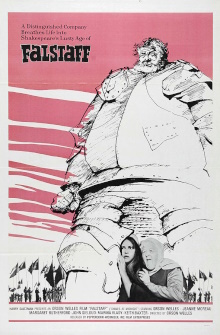This is likely the last Orson Welles film featured here since we’ve already covered most of the important ones and my wife has difficulty getting into them. I suppose it’s appropriate that Welles’ himself thought this was his finest work and fought hard to get it made, even lying to his financiers about what he was making to get it done. It’s an adaptation of Shakespeare, pulling plot details and lines from several plays, to tell the story of the character of Falstaff who Welles plays himself. Personally though I found this at times amusing and was impressed by the scale of the production, I think it says more about Welles’ own philosophy of life than anything. Welles’ attempt to rehabilitate the character is unconvincing to me and that makes this distinctly not the great film he thinks it is.
King Henry IV rules England after the true heir Edmund Mortimer is held prisoner by Welsh rebels. When Henry IV refuses to ransom him, Mortimer’s cousins raise an army in rebellion, with the most notable of them being the son of Northumberland, nicknamed Hotspur. Meanwhile Henry IV’s own son Prince Hal prefers drinking and carousing, frequently in the company of Sir John Falstaff. Falstaff is obese, cowardly, a liar, penniless and surrounds himself with prostitutes and petty criminals. Yet his roguish charm, wit and zest for life makes him good company. When his landlady pressures him to pay his bills, he hatches a plan to gather a group to rob travelling pilgrims while wearing a disguise. Prince Hal disguises himself as well and robs Falstaff in turn just for the fun of it. King Henry IV disapproves and warns his son about Hotspur’s gathering army. He calls up his own forces to meet the rebel army and even Falstaff is obliged to join, even gathering the dregs of the peasantry as his contribution. During the battle, he spends most of his time hiding as Prince Hal personally confronts Hotspur in single combat.
So the Shakespearean language isn’t easy even for me to understand and I don’t know much about the historical background either. I’m well aware that I’m missing out on a lot as this is a very dialogue dense film. Still I get the gist that this is all about the character of Falstaff and his relationship with Prince Hal. Welles’ personal fascination for the character is evident as is his conviction that for all his faults Falstaff is a decent sort, loyal to his friends, a bon vivant who is fun to be around and doesn’t deserve to be betrayed. It’s impossible not to see in Falstaff something of Welles himself, exiled from Hollywood, always broke and forced to scrounge for money, and so on. This sort of personality doesn’t appeal to me at all and so I’m not sympathetic to Welles’ attempt to have the character reexamined in a better light nor do I agree that this falling out with Prince Hal is some grand betrayal. It’s kind of fascinating to realize that this is really how Welles sees life but as I’m more inclined to applaud Prince Hal getting his life back in order and decisively taking charge of the kingdom, I don’t agree with his views at all so I could hardly be a big fan of this film.
Given Welles’ money problems and the fact that this was actually shot in Spain, I expected this to be a cheap production that cut corners. In fact, it looks really good, complete with a reasonably impressive battle scene. Even better is that it presents a gritty, realistic view of combat with none of the romanticism and glory. The sets look good too, conjuring a sense that this really is medieval England. This really was a project dear to Welles’ heart and he pulled out all the stops. Even if you dislike his interpretation of Falstaff, this portrayal of the England of the era and his delivery of the lines by Shakespeare may be reason enough to watch this. My reading of it is that for all Henry IV’s disapproval of Falstaff, he himself gained the throne by deposing Richard II. There’s no honor or decency there and even Prince Hal is unseemly in his haste to succeed his father. Falstaff may be a liar, a crook and a bastard but at least there is a certain authenticity in his simple and merry outlook on life.
Maybe I’d have liked this more if I knew more about the works of Shakespeare but this feels more like Welles expressing his own personal frustration with the world than a powerful artistic statement in its own right. It’s an interesting film to be sure and you can see so much of Welles himself in it but I doubt most people are going to get it.
